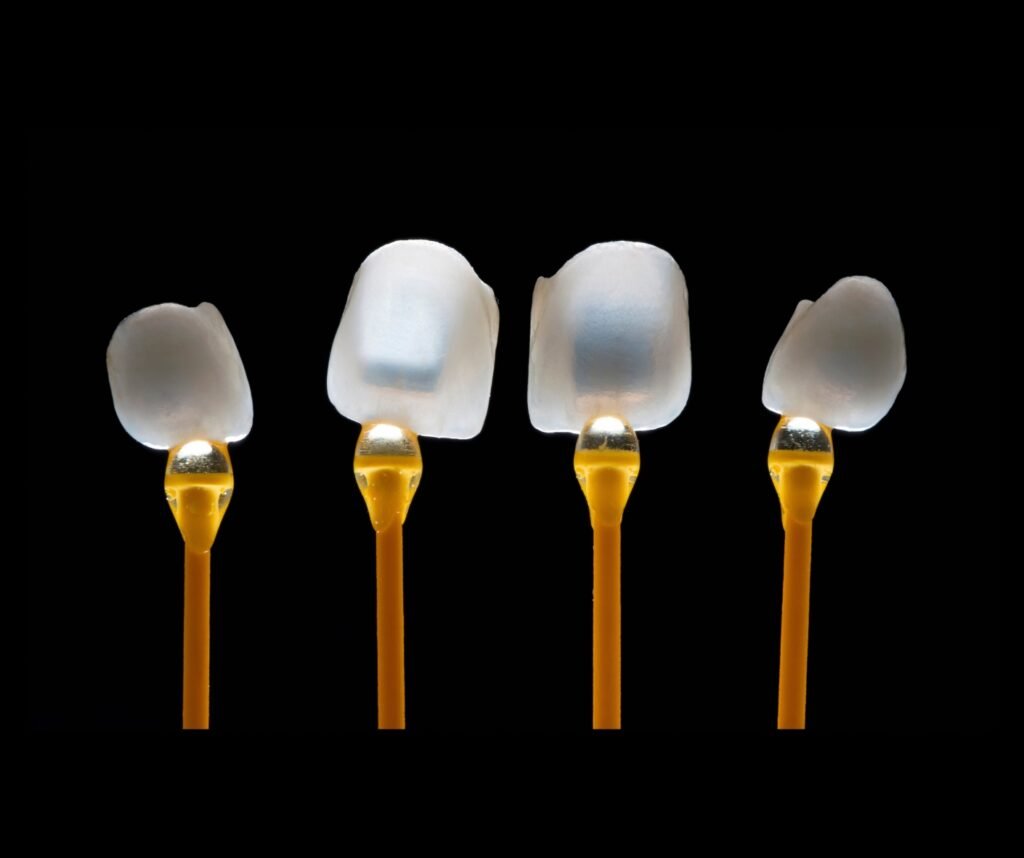Cosmetic Dentistry 101: Everything You Need to Know About Veneers
Dental veneers are one of the most popular treatments in cosmetic dentistry today. If you want to improve your smile by correcting imperfections like stained, chipped, or uneven teeth, dental veneers could be the solution you’ve been looking for. In this comprehensive guide, we’ll cover everything you need to know about dental veneers, including how they work, their benefits, and why they’re such a popular choice in cosmetic dentistry.

What Are Dental Veneers?
Dental veneers are thin, custom-made shells that are designed to cover the front surface of your teeth. These shells are usually made from porcelain or composite resin and are bonded to your teeth to enhance their appearance. Veneers can be used to correct a wide range of cosmetic dental issues, from discolouration to gaps between teeth.
Porcelain veneers, in particular, are favoured for their strength, durability, and ability to mimic the natural look of enamel. They are a popular choice in cosmetic dentistry because they provide a long-lasting solution to many common dental concerns.
Why Choose Dental Veneers?
There are several reasons why dental veneers are a go-to solution for improving smiles. Here are some of the main benefits:
1. Improved Appearance
The most obvious advantage of dental veneers is the immediate improvement to your smile. Whether your teeth are stained, chipped, or misaligned, veneers offer a quick and effective way to cover these imperfections. With veneers, you can achieve a bright, even smile in just a few appointments.
2. Natural Look
One of the reasons people opt for dental veneers is their ability to blend in seamlessly with natural teeth. Porcelain veneers, in particular, are designed to reflect light in the same way as natural enamel. This gives your teeth a more realistic appearance, making it difficult for others to tell you’ve had any work done.
3. Durability
When cared for properly, dental veneers can last for many years. Porcelain veneers are especially known for their durability and resistance to stains. While they are thin, they are incredibly strong once bonded to your teeth, offering a long-lasting solution to a variety of cosmetic issues.
4. Minimal Invasive Procedure
Compared to other cosmetic dentistry options, getting veneers is a relatively simple and minimally invasive procedure. The process typically involves removing a very small amount of enamel from the surface of your teeth (usually less than half a millimetre), which is far less invasive than other treatments like crowns.
5. Customisable
Veneers are custom-made to fit your individual needs. Your dentist will take impressions of your teeth to ensure the veneers are the perfect shape, size, and colour to match the rest of your smile. This personalisation means that you’ll get results that look natural and suit your unique facial features.
The Process of Getting Dental Veneers
If you’re considering dental veneers, it’s important to understand the process involved. Here’s a step-by-step look at what you can expect when getting veneers.
1. Consultation with Your Dentist
The first step in the process is a consultation with your dentist. During this visit, you’ll discuss your goals and expectations for your new smile. Your dentist will examine your teeth and determine whether dental veneers are the right option for you. Sometimes, other cosmetic dentistry treatments may be recommended, depending on the condition of your teeth.
2. Preparation of the Teeth
Once you and your dentist have agreed that veneers are the best option, the next step is preparing your teeth. This involves removing a thin layer of enamel to make room for the veneers. Don’t worry, this process is painless, as your dentist will numb the area before starting. After the enamel is removed, impressions of your teeth are taken and sent to a dental lab where your veneers will be custom-made.
3. Placement of Temporary Veneers
While you wait for your permanent veneers to be made, your dentist may place temporary veneers on your teeth. These will protect your teeth and give you an idea of what your new smile will look like.
4. Bonding the Veneers
Once your dental veneers are ready, your dentist will remove the temporary ones and bond the permanent veneers to your teeth. This is done using a special dental cement that hardens quickly under a curing light. After the veneers are bonded, your dentist will make any final adjustments to ensure they fit perfectly.
Porcelain Veneers vs. Composite Veneers
When choosing dental veneers, you’ll likely be deciding between porcelain veneers and composite resin veneers. While both offer great results, there are some key differences between the two:
- Porcelain Veneers: These are more durable and resistant to staining. They are also more natural-looking due to their ability to mimic the light-reflecting properties of natural teeth. However, they tend to be more expensive and require more preparation.
- Composite Veneers: Composite veneers are made from a tooth-coloured resin and are a more affordable option. They require less enamel removal and can usually be applied in a single visit. However, they may not last as long as porcelain veneers and are more prone to staining.
Your dentist will help you decide which type of veneer is best for your needs based on your goals, budget, and the current condition of your teeth.
Are Dental Veneers Right for You?

Dental veneers are an excellent option for anyone looking to improve the appearance of their smile. However, they may not be suitable for everyone. People with unhealthy gums or those who grind their teeth may not be ideal candidates for veneers, as these conditions can compromise the lifespan of the veneers. It’s important to have a thorough consultation with your dentist to determine whether dental veneers are the right solution for you.
Caring for Your Veneers
While dental veneers are durable, they still require proper care to keep them looking their best. Here are some tips to help you maintain your veneers:
- Brush and Floss Daily: Just like your natural teeth, veneers need regular cleaning. Brush at least twice a day and floss to remove any food particles that can cause plaque build-up.
- Avoid Hard Foods: While veneers are strong, they aren’t indestructible. Avoid chewing on ice or biting into very hard foods to prevent damaging them.
- Regular Dental Check-ups: Continue to see your dentist for regular check-ups to ensure your veneers are in good condition and to maintain your overall oral health.
Conclusion
Dental veneers offer a fantastic solution to many cosmetic dental issues, from discolouration to uneven teeth. Whether you choose porcelain veneers for their durability or composite veneers for their affordability, both options can give you a bright, beautiful smile. If you’re considering improving your smile, speak to your dentist about whether veneers could be the right choice for you. With the right care, dental veneers can provide a long-lasting transformation to help you feel more confident about your smile.